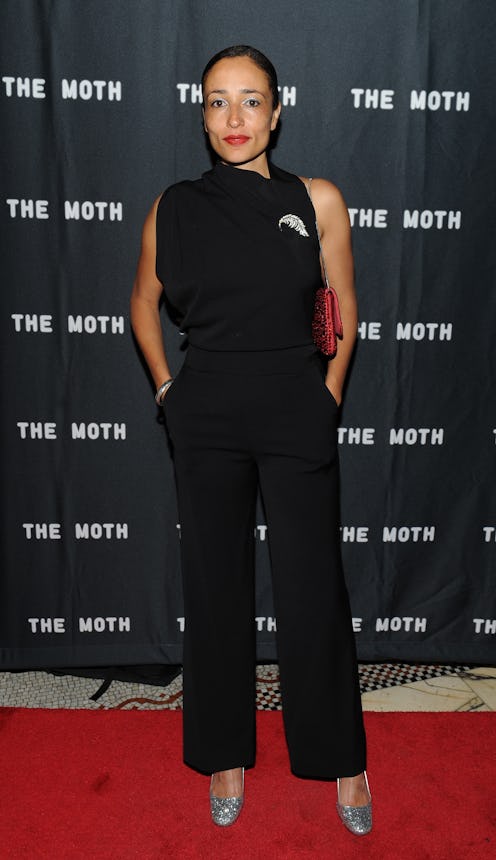Books
13 Zadie Smith Quotes On Books And Writing
The fall is finally here, bringing with it cool, crisp air, bright, beautiful leaves, and plenty of new books to get excited about, including Zadie Smith's Swing Time , out Nov. 15. A beautiful, sweeping novel about two childhood best friends finding their place in the adult world, Swing Time is one of the season's most anticipated releases, but if you're not sure if you're going to add it to your autumn TBR list, read some Zadie Smith quotes on books and writing. Her insight about the craft will change the way you read her books.
Swing Time, $19, Amazon
An English novelist, essayist, and short story craftswoman, Zadie Smith has been a household literary name since breaking onto the scene with White Teeth in 2000. Her debut novel became an immediate bestseller in her home of England as well as abroad, receiving high critical and commercial acclaim. In the 16 years since publishing her first book, Smith has penned four other full-length novels, including the forthcoming Swing Time, as well as several short stories and essay collections.
White Teeth, $10, Amazon
Smith's track record is pretty impressive on it's own, but what's more impressive still is the way the young author talks about her art and her craft. Whether she is giving an interview about an upcoming project, lecturing as a creative writing professor, or giving a moving commencement speech, Smith's insights to the wonderful world of writing are smart, honest, and moving — not to mention they'll make you want to read her work even more.
To prove my point, here are 13 Zadie Smith quotes on writing and books to get you excited for Swing Time, or to help you complete a novel of your own:
1. "Tell the truth through whichever veil comes to hand — but tell it. Resign yourself to the lifelong sadness that comes from never being satisfied."
— "Zadie Smith's 10 Rules of Writing"
2. “We cannot be all the writers all the time. We can only be who we are [...] writers do not write what they want, they write what they can.”
3. “Some writers are the kind of solo violinists who need complete silence to tune their instruments. Others want to hear every member of the orchestra—they’ll take a cue from a clarinet, from an oboe, even. I am one of those. My writing desk is covered in open novels. I read lines to swim in a certain sensibility, to strike a particular note, to encourage rigour when I’m too sentimental, to bring verbal ease when I’m syntactically uptight. I think of reading like a balanced diet; if your sentences are baggy, too baroque, cut back on fatty Foster Wallace, say, and pick up Kafka, as roughage. If your aesthetic has become so refined it is stopping you from placing a single black mark on white paper, stop worrying so much about what Nabokov would say; pick up Dostoyevsky, patron saint of substance over style.”
— Changing My Mind: Occasional Essays
Changing My Mind: Occasional Essays, $13, Amazon
4. “Writing is my way of expressing – and thereby eliminating – all the various ways we can be wrong-headed.”
5. “Don’t romanticise your ‘vocation’. You can either write good sentences or you can’t. There is no ‘writer’s lifestyle’. All that matters is what you leave on the page.”
— "Zadie Smith's 10 Rules of Writing"
6. “It might not always feel meditative, but when the book is very good you’ll notice it is because time passes in a strange way in a book you love [...] four hours you didn’t even notice, you haven’t even moved from the sofa. To me that’s kind of the ideal writing mind.”
7. “The very reason I write is so that I might not sleepwalk through my entire life.”
8. “In the middle of a novel, a kind of magical thinking takes over. To clarify, the middle of the novel may not happen in the actual geographical centre of the novel. By middle of the novel I mean whatever page you are on when you stop being part of your household and your family and your partner and children and food shopping and dog feeding and reading the post—I mean when there is nothing in the world except your book, and even as your wife tells you she’s sleeping with your brother her face is a gigantic semi-colon, her arms are parentheses and you are wondering whether rummage is a better verb than rifle. The middle of a novel is a state of mind. Strange things happen in it. Time collapses.”
9. "Women often have a great need to portray themselves as sympathetic and pleasing, but we’re also dark people with dark thoughts."
10. "I’m never interested in writing a kind of neutral, universal novel that could be set anywhere. To me, the novel is a local thing."
11. “When I write I am trying to express my way of being in the world. This is primarily a process of elimination: once you have removed all the dead language, the second-hand dogma, the truths that are not your own but other people's, the mottos, the slogans, the out-and-out lies of your nation, the myths of your historical moment - once you have removed all that warps experience into a shape you do not recognise and do not believe in - what you are left with is something approximating the truth of your own conception.”
12. "Protect the time and space in which you write. Keep everybody away from it, even the people who are most important to you."
— "Zadie Smith's 10 Rules of Writing"
